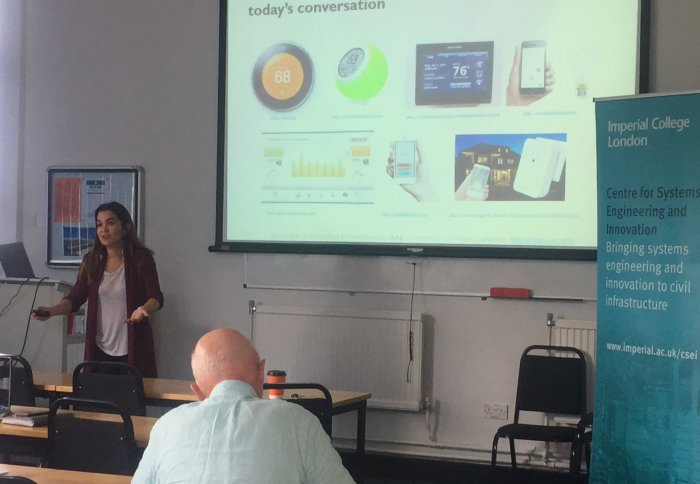CSEI Seminar - Cognitive Built Environments at the Convergence of Sensing
by Tim Gordon

On Wednesday 20th June 2018 the Centre for Systems Engineering & Innovation hosted Associate Professor Burcin Becerik-Gerber.
On Wednesday 20th June 2018 the Centre for Systems Engineering & Innovation hosted Associate Professor Burcin Becerik-Gerber. University of Southern California for our seminar series.
For a copy of the presentation please email
bbecerik-gerber@turing.ac.uk
http://i-lab.usc.edu/
Abstract
With the recent advancements in sensing, actuation and communication systems, we will soon have different interactive experiences with our built environments. This inevitable change will impact our everyday experiences, causing novel interactions between humans and buildings. Buildings “in” the near future will become interactive entities that provide “user-centered” and “dynamic” spaces for their inhabitants to perform a range of social functions. Cognitive buildings will provide unique opportunities to their users -- enriched by computing -- sensing user data, actively interacting with their users, learning their preferences while minimizing energy consumption. iLAB’s (Innovation in Integrated Informatics LAB, http://i-lab.usc.edu/) research aims at building interactive and intelligent environments (e.g., transportation hubs, office buildings, learning environments, etc.) with the end goal of impacting both human and building behavior to fulfill the goal of sustainable, resilient, healthy and comfortable built environments. The lecture will focus on iLAB’s current research in cognitive buildings. We investigate novel approaches to have environments that are not only aware of and make use of their users’ locations, processes, activities or preferences but also create environments that learn and predict what is going to happen in the foreseeable future. The focus is on establishing human centered-environments that communicate directly with the users in a dynamic and informal way, and deliver context aware, personalized and timely information for supporting decision-making, collaborative problem solving, management of resources and learning. The research investigates how to adapt to the needs of user and building objectives through the use of machine learning, artificial intelligence, autonomy, automation and data science.
Bio
Dr. Becerik-Gerber is an Associate Professor and Director of Graduate Programs at the Astani Department of Civil and Environmental Engineering of University of Southern California. She is the founding director of of the Innovation in Integrated Informatics LAB: http://i-lab.usc.edu/. Her research falls at the intersection of built environment, machine intelligence, and systems thinking. Specifically, her work focuses on the acquisition, modeling, and analysis of the data needed for user-centered built environments, and the development of novel frameworks and visualization techniques to improve built-environment efficiency, while increasing user satisfaction. She is currently advising six Ph.D. students, several masters and undergraduate students in the Informatics for Intelligent Built Environments focus area. To date, she has published more than 120 peer-reviewed papers and her work has received support worth approximately $5 million from a variety of sources. In 2012, Burcin been appointed as the inaugural holder of the Stephen Schrank Early Career Chair in Civil and Environmental Engineering. She is the recipient of MIT Technology Review’s TR35 Recognition (2012), NSF CAREER Award (2014), Viterbi Junior Research Award (2016), Mellon Mentoring Award (2017), Celebration of Engineering & Technology Innovation Award (CETI) in the Outstanding Early Career Researcher category from FIATECH (2018) and the Rutherford Visiting Fellowship at the Alan Turing Institute (2018). She serves as an Associate Editor for ASCE’s Journal of Computing in Civil Engineering since 2011.
Article text (excluding photos or graphics) © Imperial College London.
Photos and graphics subject to third party copyright used with permission or © Imperial College London.
Reporter
Tim Gordon
Department of Civil and Environmental Engineering